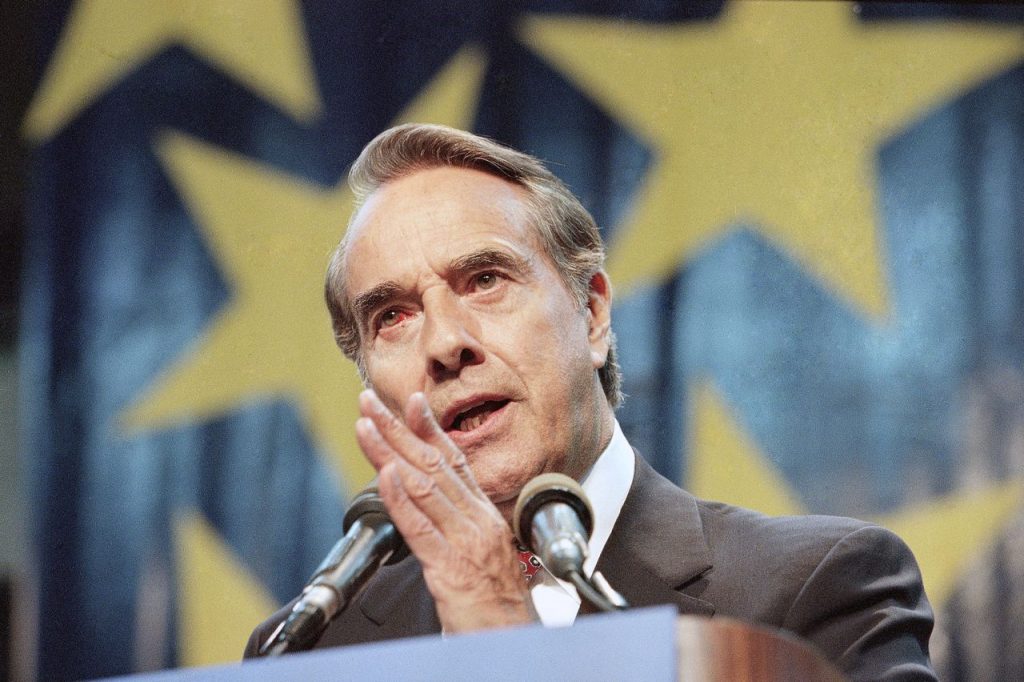
When the news reached me that Sen. Robert Dole has passed at 98, I was immediately reminded of my one and only meeting with him. I’m a disability rights activist and I’d been invited to the Finnish Embassy in Washington, D.C., to see him receive a lifetime achievement award honoring his work on the Americans with Disabilities Act. He was joined by his co-recipient, Sen. Tom Harkin. his longtime Senate colleague and personal friend. Each man spoke about the bipartisanship and determined optimism that made the ultimate passage of the ADA possible. It was hard work. It was very hard work. Listening to Dole and Harkin, I felt tears stream down my face. My guide dog wondered what was up.
My tears were about things that were altogether just and proper, for Dole spoke about the urgent need to help the disabled in all areas of society and reflected on the nature of good government. I don’t remember now precisely what he said, but the gist was that bipartisanship must be in the service of improving people’s lives, that this isn’t a Democratic or Republican dynamic. Working across the aisle on the ADA was about young people, the elderly, veterans, children, folks from every background. This was during President Barack Obama’s second term. Suddenly Dole said: ” I don’t think today’s Senate would pass the ADA. Bipartisan cooperation has vanished.”
Both Harkin and Dole were feeling a bit elegiac that evening. The Americans with Disabilities Act might be the last piece of civil rights legislation we’ll see in the U.S. I stood in the back of the room and thought about their candor. In her excellent book “American Enlightenments,” Caroline Winterer reminds us that 18th century Americans held a different view of happiness than the self-help individualized notion most people cling to today. She writes:
“The happiness of humanity. Crèvecoeur’s words — and Thomas Jefferson’s far more famous ones in the Declaration of Independence, “Life, Liberty, and the pursuit of Happiness” — remind us that the pursuit of happiness was one of the principal quests of enlightened people. But happiness meant something different in the eighteenth century from its meaning today. In our era, an industry of self-help books reminds us that modern happiness is an emotional state of self-fulfillment and personal well-being. Eighteenth-century people would have been puzzled by our narrow definition. For them, happiness first of all had expansive, public meanings. People at that time often spoke of a happy people and a happy society. A society was happy when its people enjoyed the security, stability, and peace that allowed them to prosper. The purpose of government was to create public or social happiness by shielding the state from foreign enemies and internal threats. The opposite of public happiness was not sorrow but anarchy or tyranny. Educated leaders would be the architects of the good government that led to a happy society.”
Bob Dole helped the disabled imagine their places in a happier society than they’d previously known. He did this because he was a wounded veteran of World War II and had seen up close the inadequacies of our nation’s responses to disablement, both among veterans and in the civilian population. In short he didn’t adopt a personalized view of happiness but chose the 18th century view. Later I screwed up my courage and ambled his way with my trusty guide dog, a yellow Labrador, and I stuck out my hand and thanked him and said the ADA may well be the last act of Enlightenment optimism. I no longer recall precisely what he said but it was something like: “When it’s all over, it’s not who you were … it’s whether you made a difference.”
You can find poetry in the law but not often. There’s not much poetry in the ADA. But of the good there is much. Make the ways straight for those with altered bodies. Let them in. Affirm they are part of the village, the school, the bus ride, the library, the media, the simple, everyday world which we call daily life. Thank you, Sen. Dole.
Stephen Kuusisto is an American poet, essayist, fiction writer, memoirist and disability rights scholar who teaches at Syracuse University. He is the author of the memoirs “Planet of the Blind,” “Eavesdropping: A Memoir of Blindness and Listening” and “Have Dog, Will Travel.”
Publish Syracuse News Dec. 07, 2021
https://www.syracuse.com/opinion/2021/12/thanks-to-sen-bob-dole-disabled-americans-truly-can-pursue-happiness-guest-opinion-by-stephen-kuusisto.html